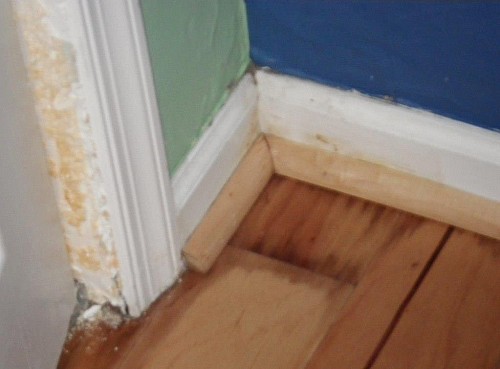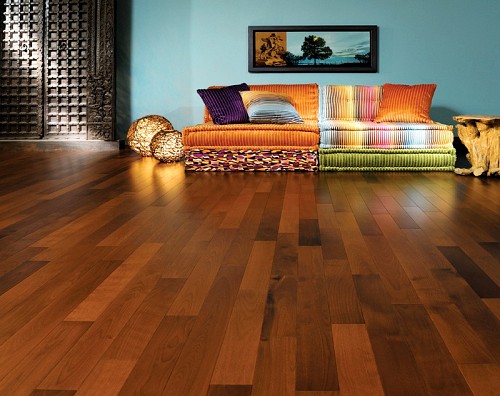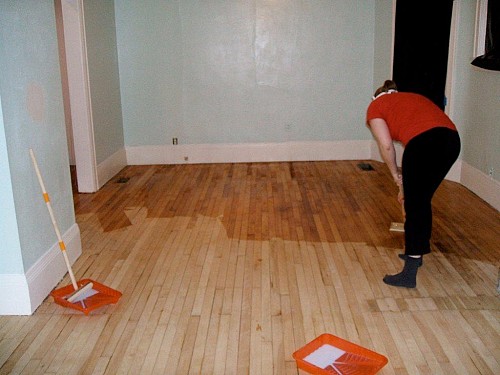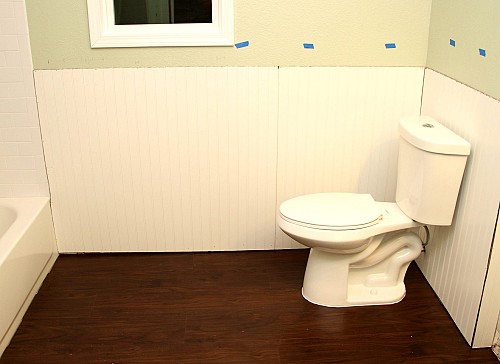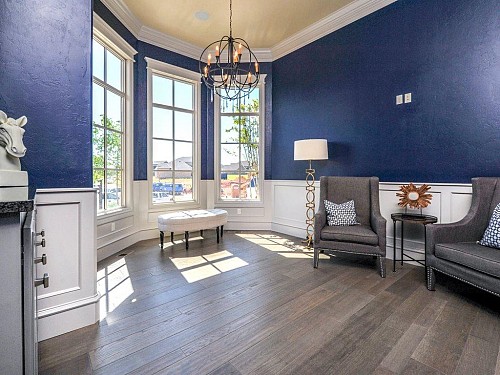Is Waterproof Hardwood Flooring Really A Thing?
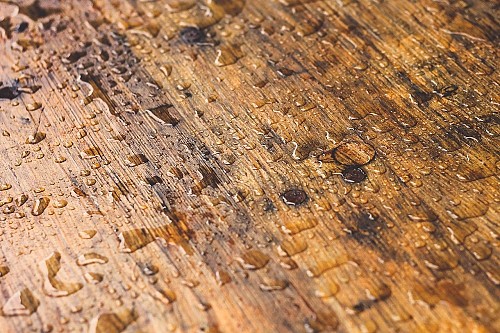
Ah! Handsome hardwood flooring, the homeowners’ delight. Just one problem – moisture is hardwood’s kryptonite. If only someone would invent a waterproof hardwood flooring...
Well, guess what? They have! Waterproof hardwood flooring appeared on the home improvement market toward the beginning of 2019, and it’s catching on fast.
Find out why.
The Threat to Non-Waterproofed Wood Floors
While untreated solid hardwood floors can withstand a few drops of water, when doused with larger quantities they start to resemble a sponge. If you’re too busy to wipe up spills, pet accidents, or tracked-in snow immediately -- or if you have an undetected moisture problem (such as an air conditioner leak) -- beware!
Eventually, all these liquids will cause unprotected wood flooring to swell, bloat, and warp. A badly water-damaged hardwood floor cannot be repaired; instead, it is likely to rot and/or mold and will need to be completely replaced. That means unwelcome hassle and expense for you.
What Is Waterproof Hardwood Flooring?
Waterproof hardwood flooring is natural hardwood, pine, or bamboo that has been enhanced by technology to make it impervious to liquid. The tech varies according to the manufacturer. For example, Shaw makes a product comprising a layer of real wood on top of a core of stone polymer composite (SPC).
All producers do add one common element, though -- a highly protective finish to guard against both water infiltration and everyday wear and tear, such as scratching and scuffing.
Who’s Got It?
A number of America’s largest flooring businesses all have their own version of waterproof hardwood:
- Mohawk -- RevWood
- Shaw -- Floorte
- USFloors -- Coretec
- Flooring America/Flooring Canada (FA/FC) -- Aquadura H2O
- Carpetone –- Hydrotek
- Innovative Flooring Supply –- Noah
The technology is still quite new but as its reputation spreads, other companies are likely to jump on the bandwagon as well.
Read the pros vs cons of waterproof hardwood flooring below, then consult a reliable flooring professional for advice on the best type for your home.
Waterproof Hardwood Flooring: Pros
Beauty. This new flooring has all the rich luster of genuine hardwood, the flooring most prized by homeowners AND home buyers.
Versatility. Enjoy hardwood floors anywhere in the house, including rooms formerly “off limits” to real wood floors, like the kitchen, mudroom, laundry, kid’s room, or even an elegant master bath.
Authenticity. Unlike ceramic tile or laminate, you will never see a pattern repeat in waterproof wood flooring.
Choice. Choose your personal favorite from a variety of wood species, attractive finishes (such as hand-scraped), and plank widths.
Peace of mind. When your lifestyle includes kids, pets, and tons of activity, spills and splashes are impossible to avoid. With waterproof flooring, you can relax … no harm done!
Waterproof Hardwood Flooring: Cons
Expense. The cost to purchase waterproof flooring is higher than that of conventional wood.
Limited selection. Despite the style choices available, there is still a more limited selection than you’d get with traditional wooden flooring.
Refinishing not an option. Waterproof hardwood cannot be sanded down and refinished, although its durability and high scratch resistance make that less of a minus than you might fear.
Can You Waterproof Your Existing Hardwood Flooring?
First, let’s explore the difference between two frequently confused terms: waterproof vs water resistant. My Merriam-Webster’s definition of waterproof is “impervious to water,” but water resistant is defined as merely “water-repellent,” meaning that sooner or later, the water will penetrate the wood.
If you already have natural wood floors installed in your home, you won’t be able to make them completely waterproof. However, you can use the right treatment to make your flooring more water resistant, with the result that spilled liquids don’t have to be dealt with immediately. If necessary, they can be left for hours before they begin to harm the wood’s structure.
Here’s how.
Sand and clean your wood floor. Then treat with one of the following finishes:
- lacquer
- polyurethane sealant
- varnish
- combination stain/sealant
- linseed oil
- tung oil
Allow the finish to dry thoroughly, according to product instructions, before walking or replacing furniture on the wood surface.
Other Popular Waterproof Flooring Options
Low-maintenance, waterproof flooring of all types is a growing trend in home decor. If you decide that waterproof wood is not for you, investigate the alternatives.
- Vinyl Plank Flooring
Vinyl plank is an obvious choice for waterproof practicality. With new digital printing techniques, luxury vinyl offers you gorgeous looks, as well.
PROS: Vinyl is easy to install, lightweight, and simple to maintain.
CONS: It's impossible to repair or recycle; may off-gas unpleasantly; does not add to the value of your home.
- Tile Flooring
Stone, porcelain, and ceramic tile are all excellent materials to create waterproof flooring. A tile floor is only as good as its grout, however, so make sure that your grout is well sealed.
PROS: Tile is handsome with oodles of curb appeal. Tile repair can be done by just replacing the damaged tile(s).
CONS: It is complex to install (a very challenging DIY project); may be slippery and/or cold underfoot.
TIP: Find a licensed & experienced tile contractor to ensure your project goes smoothly.
- Waterproof Laminate Flooring
Old school laminate flooring was somewhat water resistant but definitely not waterproof. Even the slightest spill had to be wiped up within minutes before it could deal a death blow to the floor’s fiberboard core. However, the waterproof laminate of the 2020s gets around this problem quite handily, since it is all plastic.
PROS: Waterproof laminate provides the advantages of laminate without its downside, easy to clean, recyclable.
CONS: It's available mainly in Europe as of this writing.
- Pergo Waterproof Laminate Flooring
The original laminate flooring, Pergo is still the gold standard. Now the firm offers two waterproof versions, OutLast and TimberCraft, which combine a hydrophobic coating with tight Uniclic locked-together joints to trap water atop the laminate surface.
PROS: Pergo offers advanced technology and outstanding appearance. It is scratch-resistant and easy to install as a floating floor.
CONS: It's not as sought-after by home buyers as hardwood flooring.
Laura Firszt writes for networx.com.
Looking for a Pro? Call us (866) 441-6648

Flooring Average Costs
Flooring Contractors Experiences

Beautiful Tile Backsplash Completes Our Kitchen Remodel

Tile Installation For New Kitchen Backsplash And Guest Bathroom Floor

